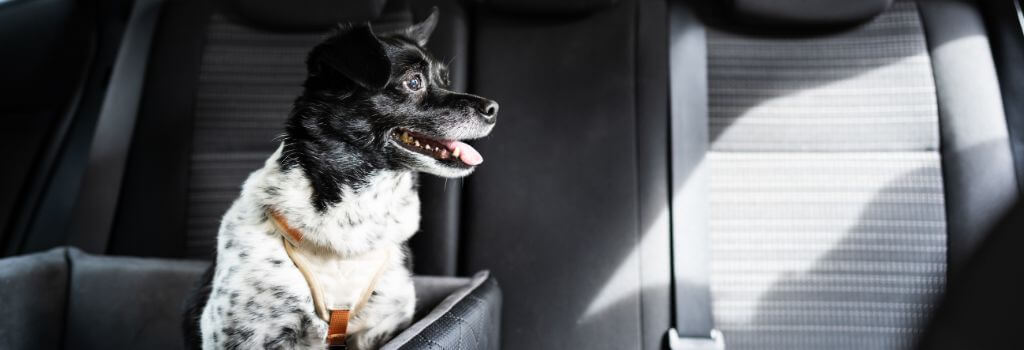Have you ever taken a ride with your dog, and as you glance in the rearview mirror to check, you see your pup drooling excessively and pacing the back seat? You’re not alone. Many dogs struggle with motion sickness, which can be stressful for your pet and dampen the adventure for everyone.
The good news? There are plenty of ways to help! Whether your dog experiences mild nausea or full-blown car sickness, understanding the causes and solutions can make a big difference. Join us as we break down why some dogs are more prone to motion sickness, how to spot the signs, and what you can do to make car rides a smooth and stress-free experience for your dog.
Recognizing Motion Sickness in Dogs
Motion sickness in dogs can be easy to spot once you know what to look for. Many dogs experience excessive drooling (think Saint Bernard like Beethoven), whining, restlessness, or acting a bit sluggish. Some may lick their lips, yawn repeatedly, and start vomiting (hopefully not on your lap!) because of the drooling. Sometimes, dogs will refuse to get into the car altogether, associating it with nausea and discomfort.
If you notice your dog often showing these symptoms while traveling, motion sickness is likely the culprit.

Motion Sickness vs. Anxiety vs. Digestive Issues
Not all car-related issues are caused by motion sickness—some dogs experience travel anxiety, while others may have underlying digestive problems.
Here’s how to tell the difference between motion sickness, anxiety, and GI issues in your dog:
- Motion Sickness:
- Happens only during car rides
- Includes drooling, vomiting, or lethargy
- Improves once the car ride ends
- Anxiety:
- Starts before the car ride—your dog panics at the sight of the car or leash
- Includes whining, barking, or shaking, even without vomiting
- May not improve after the ride is over, lingering for hours
- Digestive Issues:
- Vomiting happens at random times, not just in the car
- Accompanied by diarrhea, gas, or lack of appetite
- Doesn't improve just by avoiding car rides
If you’re unsure, try a short test drive. If your dog seems fine on solid ground but miserable in motion, you’re likely dealing with motion sickness. If symptoms persist even when not traveling, it’s best to consult your veterinarian!
Why Do Some Dogs Get Motion Sickness?
Some dogs are naturally more prone to motion sickness than others. Puppies are especially susceptible because their inner ear structures, which control balance, are still developing. While some dogs outgrow it, others remain sensitive. Certain breeds, such as small dogs and brachycephalic (flat-faced) breeds, are also more likely to experience nausea.
A negative experience, such as vomiting during an early car ride, can lead to anticipatory nausea, where a dog feels queasy before even getting into the vehicle. Stress and anxiety can also trigger nausea, especially in dogs that associate car rides with unpleasant events like vet visits.
Limited early exposure to car rides, strong smells, and inadequate ventilation can also contribute to motion sickness. Furthermore, unstable riding conditions, like sliding around in the vehicle, can heighten a dog’s disorientation and discomfort.

Preventing and Managing Motion Sickness in Dogs
While some dogs outgrow motion sickness, others need a little extra help.
Here’s how you can make car rides easier for your pup:
- Start with Short Trips: Gradually introduce your dog to car rides with brief, positive experiences before attempting longer trips.
- Use a Crate or Car Seat: A properly secured dog feels more stable and less anxious. Crates, car seats, and harnesses designed for travel can help minimize movement.
- Comfort Items Matter: Bringing a familiar blanket, toy, or even an item with your scent can help soothe an anxious traveler.
- Ventilation is Key: Crack a window slightly to balance air pressure and reduce nausea.
- Try Calming Music or White Noise: Soft sounds can create a relaxing environment for nervous dogs.
- Avoid Strong Smells: Keep the car free of air fresheners, cigarette smoke, or strong-smelling food that might trigger nausea.
- Take Frequent Breaks: On longer trips, stop every hour or so to let your dog stretch their legs and get fresh air.
- Exercise Before the Trip: A little playtime or a short walk before traveling can help burn off nervous energy and make your dog more relaxed.
Can Training Help Reduce A Dog’s Motion Sickness?
Yes, with consistent training, many dogs can overcome or at least tolerate car rides better. Creating positive associations with the car is an effective first step. Giving a dog treats, praise, or a favorite toy while they sit in the parked car can help make it a more welcoming and safe space for your pet.
To help build confidence, gradually increasing your dog’s time in the car can be really effective. Start with short drives, be sure to reward calm behavior, and consider having a special travel treat that your pet only gets in the car; it’s a great way to create positive associations. Plus, this makes the experience more enjoyable for both of you! Don’t forget to mix in some fun destinations like trips to the park! This way, the car doesn’t just become a place that leads to stressful events like vet visits.
For dogs that panic at the sight of the car, desensitization training can be helpful. This involves gradually exposing the dog to the vehicle in a non-threatening way, such as sitting in the parked car before progressing to short drives. With patience and consistency, many dogs learn to tolerate, or even enjoy, car rides over time.
The Role of Diet in Preventing Motion Sickness for Your Dog
What your dog eats—and when—can make a big difference in preventing motion sickness.
Here are some dietary tips to help manage nausea on the road:
- Timing Matters: Avoid feeding your dog a large meal within 2-3 hours before a car ride. A full stomach can increase the chances of nausea and vomiting.
- Light Snacks Can Help: Some dogs do better with a small snack (like a few kibbles or a plain biscuit) before travel, as an empty stomach can also lead to nausea.
- Avoid Fatty or Rich Foods: Greasy, heavy, or rich foods before travel can upset your dog's stomach and increase the risk of motion sickness.
- Hydrate: Keep your dog well-hydrated before travel, but don’t let them gulp large amounts of water right before a car ride.
- Ginger as a Natural Remedy: Some pet owners find that a small amount of ginger (fresh, powdered, or in treat form) can help settle their dog's stomach. Always check with your vet before introducing new remedies.
- Special Diets or Supplements: If your dog has frequent motion sickness, talk to your vet about specialized diets or supplements that can help with nausea.
By managing when and what your dog eats, you can reduce the risk of motion sickness and keep car rides more comfortable.
When to See a Veterinarian for Your Dog’s Motion Sickness
It's not unusual for pets to experience car sickness from time to time, but there are moments when a visit to the vet is necessary. If your dog starts showing signs of motion sickness after having enjoyed car rides in the past, it might be a sign of something more serious, like an ear infection or a neurological issue. If symptoms continue even though you’ve been working with your pet, a veterinarian can help rule out underlying health issues.
Extra support may be needed for dogs that show signs of severe anxiety, such as excessive panting, shaking, or refusing to hop into the car. In such cases, your veterinarian might suggest medications to help ease their discomfort. If you’re thinking about using prescription or over-the-counter motion sickness medications, your vet can recommend the safest and most effective options.
Move Over Motion Sickness
Motion sickness can make car rides challenging for both dogs and their owners, but with the right approach, it doesn’t have to stop you from enjoying adventures together. By understanding the causes, spotting the signs, and using training techniques or preventative measures, you can help your dog feel more comfortable on the go. Whether it’s a quick trip to the park or a long road trip, a little preparation can go a long way in making travel a positive experience for everyone involved.
If you have questions and you'd like to reach out to us, you can call us directly at (941) 253-5218, or you can email us at staff@uacvet.com. Don't forget to follow us on social media Facebook, Instagram.
